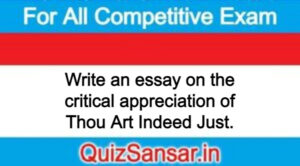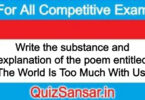
Write an essay on the critical appreciation of Thou Art Indeed Just.
Write an essay on the critical appreciation of Thou Art Indeed Just.
Ans.
Introduction
The sonnet Thou Art Indeed Just was published in 1889, Hopkins was not satisfied with his life and its achievements. He had recently wasted his five years in Ireland. He was no happy with the little he had done. He could do nothing due to his hopelessness and nervous weakness. He was ashamed of himself. The same ideas he expressed in a letter written to his friend Robert Bridges, “All impulse fails me: I can give no sufficient reason for going on. Nothing comes. I am a eunuch-but it is for the kingdom of heaven’s sake.” Though Hopkins was not forbidden by his religious sect to compose or publish poetry yet he followed the priestly duty not to work for personal glory. This letter reveals poet’s mood in writing this sonnet.
Development of Thought: His Despair and Faith
The poet in the beginning of the sonnet assumes his faith in the God. He wants to argue with him as it is no more a vice to utter what is right. He asks God why the sinners prosper in this world while his own efforts to get success and fame end in smoke. He nourished a revolutionary idea in his brain that God may be his enemy but on the same moment he recollects himself and calls God as his friend. The poet complains why his efforts to produce a good and permanent work go in vain. On the other hand in this world drunkard and frail men lay idle and win prosperity. Even the birds are happy in making their nests. Plants and thickets intertwine with lined leaves and the wind shakes them pleasantly. Hopkins comes to his own griefs that he is “Time’s eunuch” and cannot produce any work of permanent fame. In the last line of the sonnet the poet concludes his thoughts and calls God as his own. He prays him to provide some power so that his existence may survive. The poet utters his despair throughout the sonnet.
Note of the poem
Hopkins never calls God on equal terms in his earlier poetry as he call God “Sir, thou my friend”. Here the poet is not full of devotion though he has a reverence for God. Hopkins would like to know the reason of his failure and disappointment. The problem now before him is why religion and faith should not have reason or faith be entirely divorced from reason. To deny one’s intelligence and to forget the questioning mind is to dens one’s humanity. Hopkins speaks God with reverence but this manner is of a man to his senior man, he speaks to God on equal terms. However the belief in God is still strong. He asks God Why do sinners ways prosper?’ For the moment Hopkins dares to think God as his enemy, but immediately it is followed his deep affection “Wert thou my enemy. O thou my friend?”
Language
Hopkins is considered to be an obscure poet for his unique ideas, extraordinary names and far-fetched mythological references and abnormal philosophy. This one is a lucid and clear a poem. There is nothing obscure in the poem regarding syntax. Some irregularities are there, of course as in line fourteen ‘mine’ does not fit in the sentence. He used some comparisons like ‘birds build – but not I build.” The sonnet is written in the standard rhythm. It is clear for the despair of the poet. In the beginning he seems revolutionary In the mind of the sonnet he reminds us of spring season. Later he comes on the evil mankind and at last he confesses his desire, and devotion in God. It is an estimate of poet’s own life, unobtained aims and fragmentary nature of works.
-
Write the critical appreciation of the poem No. 12 entitled Far Below Flowed.
-
Write the critical appreciation of the poem No. 11 entitled Leave this Chanting.






